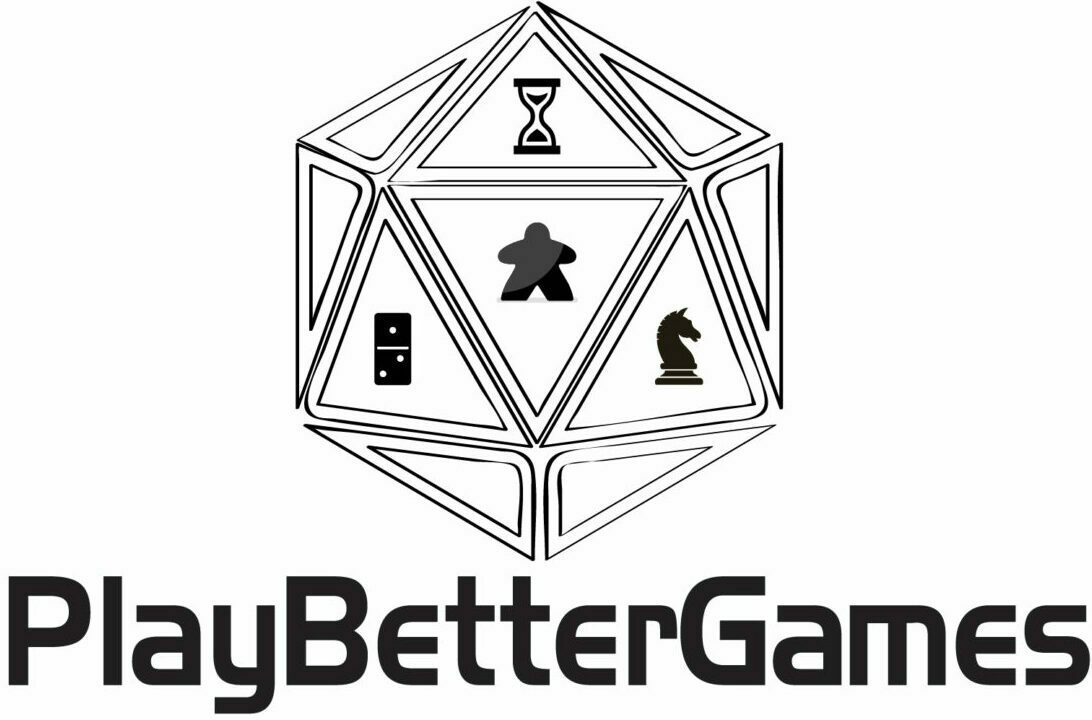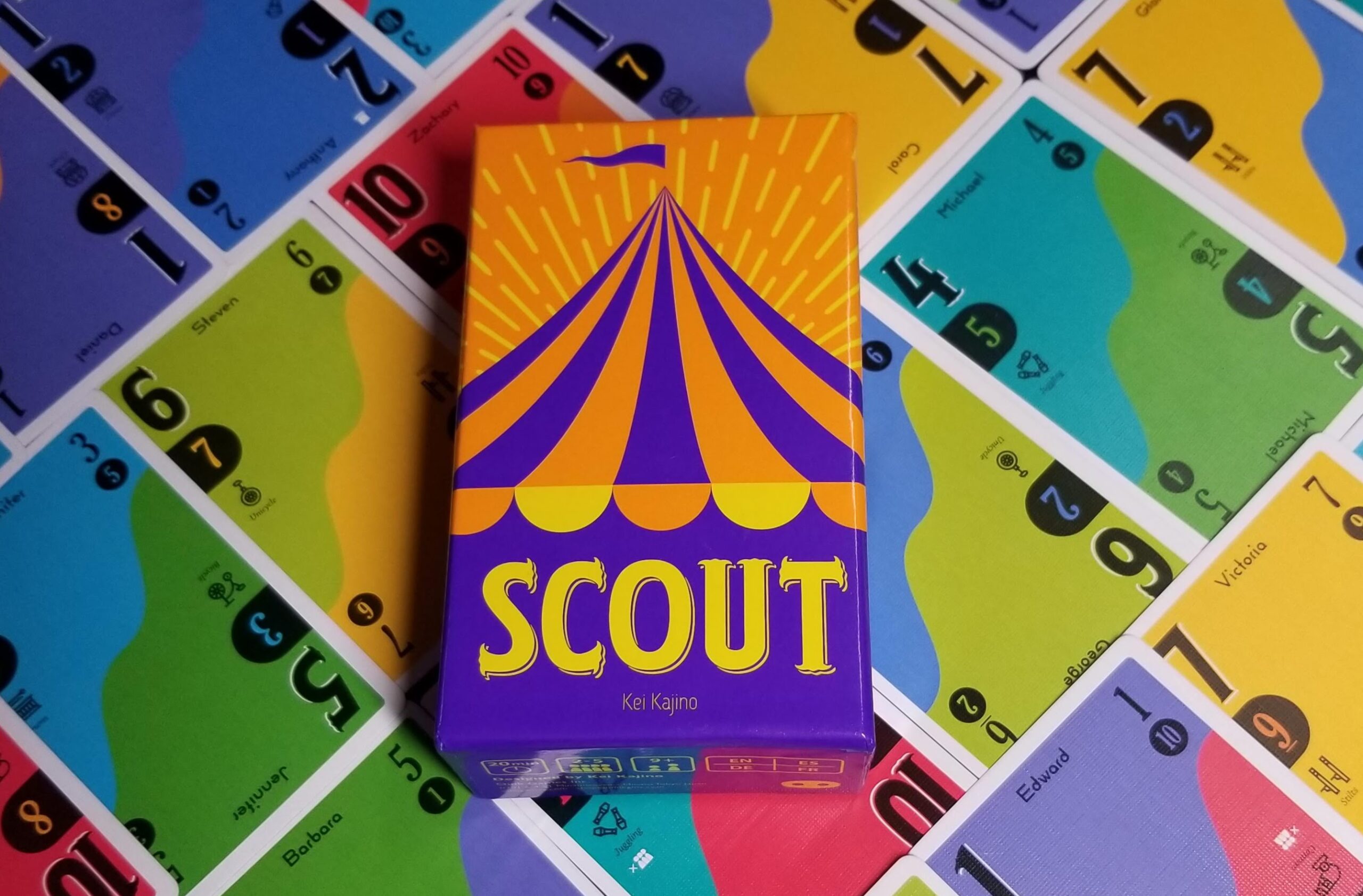Every so often I run across a game that is intriguing simply because it has a mechanic I haven’t seen before. This is exactly how Scout ended up in our collection. Scout is a really good game with a really bad theme. Luckily the theme has no bearing at all on the gameplay, and can simply be ignored.
Imagine a game where you have to play your cards in sets and runs, but can only play cards that are next to each other in your hand. Oh – and you can’t rearrange your cards. Now imagine that even with a locked in card order, the game still gives you interesting and strategic choices to make, and is easy enough for children and casual gamers to play. Intrigued? So was I. Let’s take a look at Scout.
Overview
Scout is a ladder climbing game from Oink Games and designed by Kei Kayno. Oink games is known for making games with a small footprint, and they pack a lot of game into this little box. The essence of a ladder climbing game is that someone plays a card, or series of cards and the next player has to play cards that beat what the previous player played. If you’ve ever played BS or President you have played a ladder climber. If you haven’t tried a game like this before, Scout is a good place to start.
The Scout card game has a very flimsy theme that I wish they had left off. In Scout you are managing a circus and you’ll either put on a show (play cards) or scout a performer away from a competing circus (take a card from one end of the previous show). Once per round you can do both on a single turn.
How to Play Scout
In Scout each player is dealt a hand of 13 cards and once they look at them, the order of the cards can not be changed. Each card has two numbers on it one on the top and one on the bottom. The first choice a player has is to decide which way they want to play the hand.
They can either play it the way they view it initially:
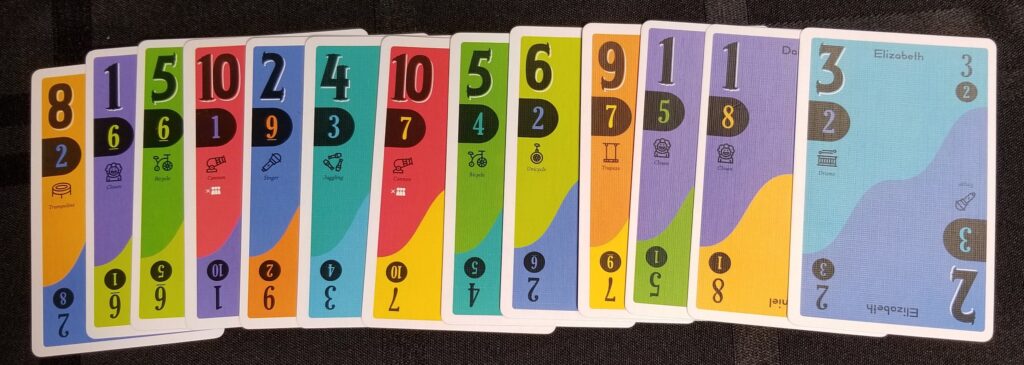
Or they can turn the entire hand upside down and play the cards from that direction.

The goal of the game is to be the first player to get rid of all of your cards, and you can only play cards in the following configurations:
- Single Card
- A Set (i.e. a Pair or X of a kind)
- A Run (i.e. 1,2 or 4,5,6,7)
You can only play a run or a set from your hand if the cards are already next to each other, so when deciding which direction to play your cards you’ll want to pick the side that already has the most cards together, or where you can get cards together by playing the cards that are in the way first.
Taking a Turn
When you take your turn in Scout. you take one of two possible actions, you show (put cards down that beat the previous player) or you scout (take a card from one end of the previous show). When you play a show you play it in front of yourself and it stays there until someone beats it and collects the cards.
You may choose to scout even if you have a show that would beat what’s on the table, and when you scout a card you can place it anywhere in your hand in either orientation.
This is where the strategy and meaningful choices come into the game.
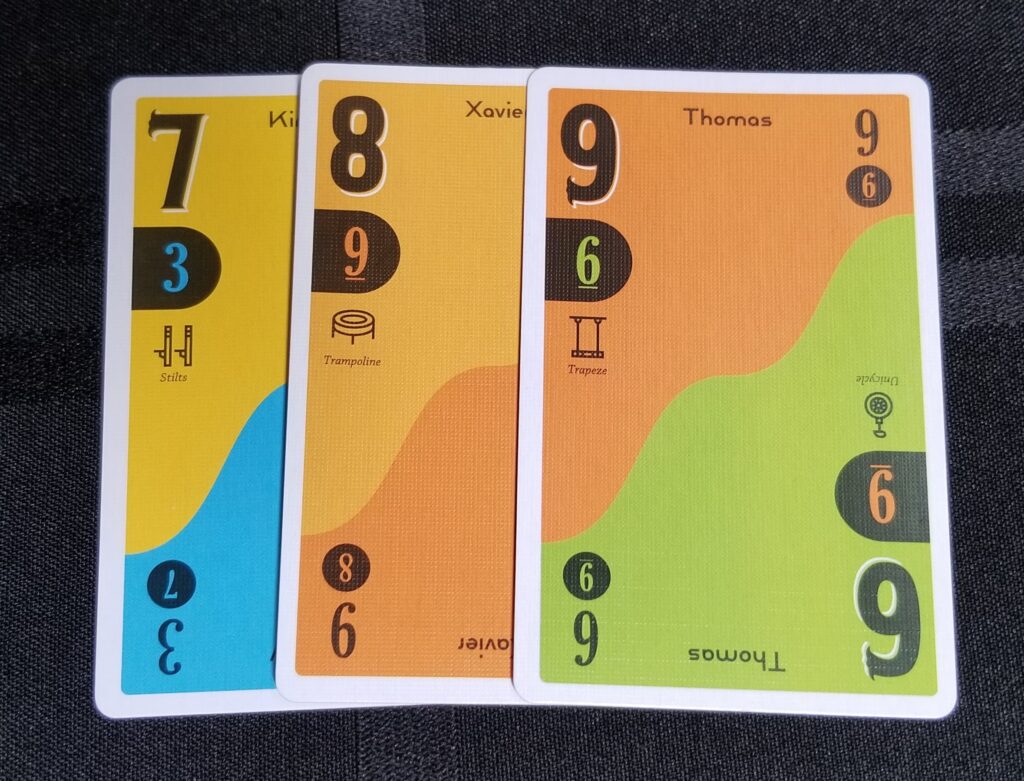
If scouting a card in the above example you can see that the cards on the ends are a 7 and a 9Young On the other side of those cards (also denoted by the smaller number on the top of the card) there is an 3 and a 6. I can only take one card from one of the ends, but I have four potential numbers to choose from and I can place the card anywhere in my hand.
The other way you can manage your and is by finding opportunities to play the cards that are in between you sets and runs.
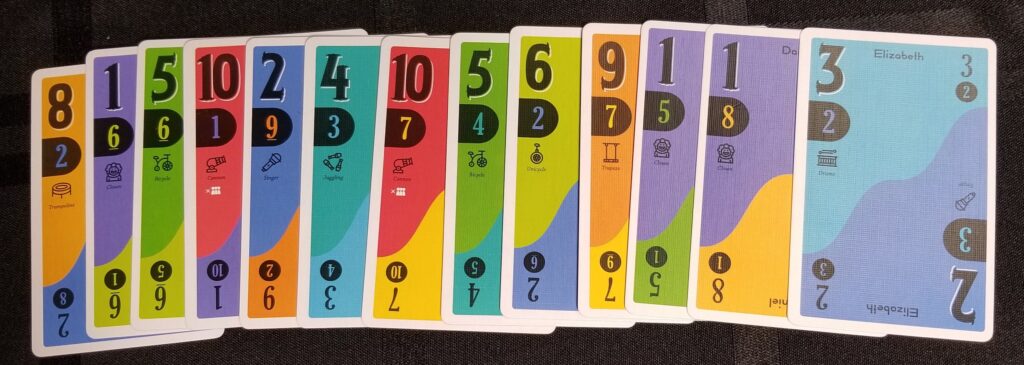
In the above example I have a possible run of 4, 5, 6, but I have an 10 in the way. If I can find an opportunity to play that single 10 first, I now have a run of 4, 5, 6,. Even though your card order is locked there are still opportunities for you to manage and control your hand.
Hand Rankings In Scout
Every time you play you’ll have to beat what the player before you played. The hand rankings are as follows:
- A longer show (more cards) always beats a shorter show
- If the shows are the same length
- A set (X of a kind) beats a Run (A, B, C)
- If both shows are Runs, the Run with the highest card wins
It’s pretty straight-forward but for some reason people sometimes have a hard time remembering it. The game doesn’t come with any kind of player aide to assist with this, so I will be making one and I’ll make it available for download.
Scoring in Scout
Whenever you play a Show that beats the previous Show you take the cards from the previous show and place them in your personal scoring pile. Each card in your scoring pile is worth one point. You also get a point every time a player chooses to scout from your show (designated by the included tokens). Each time a player scouts a card from the end of a show it makes that show easier to beat for the next player because you only ever have to beat what’s left on the table.
Ending the Round
A round ends in Scout in one of two ways:
- Someone gets rid of all of their cards
- Someone plays a show and all of the other players scout from it, leaving at least one card still in front of the player on their next turn.
When this happens all of the cards left in players hands are negative points and are subtracted from their score for the round
Ending the Game
In Scout you play the same number of rounds as their are players, after that you count the final scores. The game is best with 4 or 5 players. There are rules for two players but it just doesn’t work as well. The game really needs at least 3.
Scout Strategy
There is a lot of nuance to Scout, and to be honest I don’t think I’ve played enough yet to give you the definitive strategy guide, but here are some tips:
- When deciding which orientation to play your cards in, don’t just look for existing sets and runs, look for possible shows with only a few unrelated cards sandwiched between them.
- If playing with three or four players a large show can end the round but with five players it’s much less likely to get all the way around the table as the show dwindles.
- Sometimes it’s better to scout and try to build up a big future show even if you could play
- Be strategic about when you use you “Scout & Show” token, and don’t forget to use it! It when timed right it can really swing the game.
What We Like About Scout
Novel Mechanic
I’m a sucker for a new game mechanic. I like to be able to show people games unlike anything they’ve played before and for most people Scout will fit that bill . I love that there is a restriction you have to work around, but there are ways to puzzle it out and strategize . I expect Scout will get a lot of play at our table, so I’ll probably end up sleeving these cards.
Easy to Learn & Play
Scout is very quick to teach and will be easy for anyone who has played Rummy-based games to pick up. It also plays in about twenty minutes.
It Pretty Light
Scout has enough strategy to be interesting, but not so much that it requires total focus. Once you get the hang of it, you can easily play and socialize at the same time.
Good Player Count
Scout is a great game for people who like like Spades and Euchre but accommodates a fifth player, making it a good choice if you have an extra person. I wish it played six, but it’s nice that it plays more than four.
Criticisms of Scout
Theme
The theme is just awful. It would have been better of they had just not had one at all. Not all games need a theme. Rummy doesn’t need one, Euchre doesn’t need one. Just. having a game with simple rules to teach is fine. The only thing this theme adds to the game is questions from new players about why the cards have names on them. They really should have just created a great card game and left it at that.
What Size Sleeves Do I Need for The Scout Card Game?
I would recommend the MDG-7078 Premium Sleeves From Mayday games. I haven’t sleeved our set yet, but these would be the appropriate size. As I mentioned Oink Games is known for making small box games, so the cards will no longer fit in the original box once sleeved. If you sleeve the game I would recommend storing it using our card game storage solution.
Can You Play Scout Online?
As of the time of this writing I am not aware of any site where you can play Scout online. If that changes I’ll post an update here.
Is Scout Worth The Money?
Scout is kind of expensive for a card game, but it’s really well done and is probably one of my favorite card games right now. It was nominated for the Spiel des Jahres in 2022 (losing to Cascadia). I think it’s worth getting because it’s a very approachable game and will appeal to casual game players who are used to trick taking or Rummy like games. It also is unique and will be unlike anything most people have played before. You used to have to import this game from Japan but it is now becoming more widely available and can be found online.
Final Thoughts
There is a lot of love in this tiny little box. I love it because it’s light, but it will be something brand new to most people you introduce to it. It’s a great fit for a night with your “gamer” friends, but it’s also approachable enough to pull out at your next family gathering. It’s a little hard to find right now, but it can be found on Amazon most of the time now. It’s one of my favorite new card games right now, and it’s worth the effort to get your hands on a copy!
